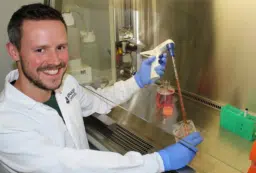Liam O’Brien – Clinical Facilitator, Mater Research
New hope for advanced melanoma patients who don’t respond to life-saving drug
Thanks to Mater Research scientists, there’s now hope for the 7 out of 10 advanced melanoma patients whose bodies don’t respond to the latest lifesaving cancer drug.
For 30% of patients, a new drug (‘Pembro’) gives them incredible responses and they achieve long-term immunity, with no cancer relapses.
However, the rest don’t respond, and researchers didn’t know why. Now, Liam O’Brien and his colleagues have shown why, opening the way for other scientists to find a way around this problem for the majority of advanced melanoma patients.
The drug Pembro tells the ‘workers’ of your immune system – the T-cells – to destroy tumours. Mr O’Brien used a cutting-edge model to find out that activating the ‘bosses’ – the dendritic cells – enhance how T-cells work, responding to Pembro.
Usually cancer cells ‘switch off’ the T-cells killing them, evading the body’s response to get rid of the cancer. They fool the T-cells into thinking they don’t need to respond, effectively ‘hiding’ from the immune systems’ sentinels. Drugs like Pembro work by stopping cancer fooling the T-cells.
“Now we know that a rare, specialised type of dendrite cell is crucial for generating anti-cancer immunity with new drugs like Pembro,” says Mr O’Brien. “If we target this dendritic cell, we will be able to improve how people respond to the checkpoint inhibitor drugs like Pembro.”
Mr O’Brien works with colleagues including Professor Kristen Radford and Dr Martina Proctor





 Fresh Science is on hold for 2022. We will be back in 2023.
Fresh Science is on hold for 2022. We will be back in 2023.